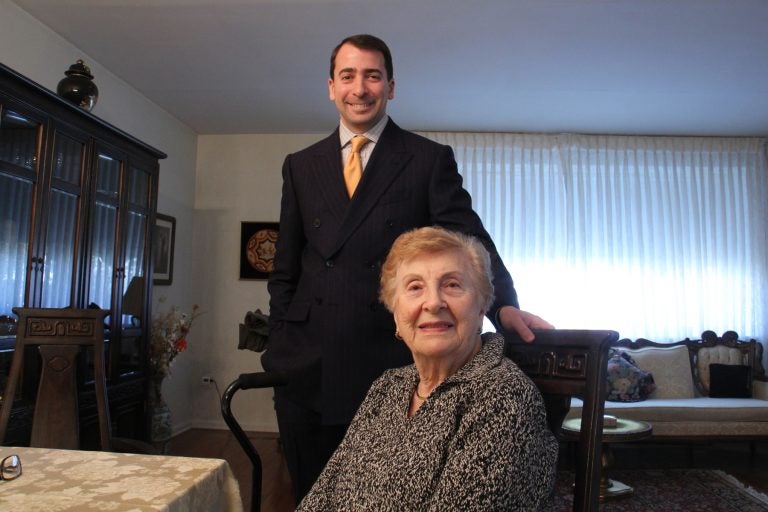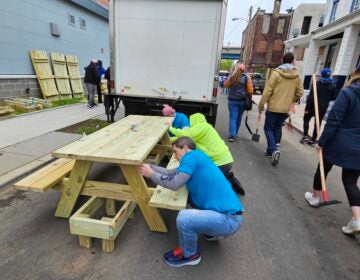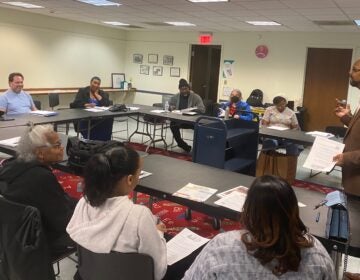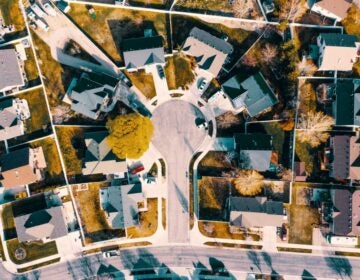Aging Holocaust survivors need help maintaining homes they can’t bear to leave
On International Holocaust Remembrance Day, the Jewish Federation of Greater Philadelphia is seeking support to help survivors stay safely and comfortably in their homes.
Listen 3:42
Brian Gralnick of the Jewish Federation of Greater Philadelphia is working to help 91-year-old Holocaust survivor Sylvia Genoy keep her home in Northeast Philadelphia. (Emma Lee/WHYY)
When Sylvia Genoy was 13 and living in eastern Poland, she witnessed one family member after another herded up and sent to death camps run by the Nazis.
Seated at the kitchen table in her modest home in Northeast Philadelphia, Genoy, now 91, spoke of the loved ones killed during the Holocaust.
“My mother. Three brothers. My father died together with my brothers. My sister-in-law. Her 2-year-old son. My aunt, and a lot of her children. She had six children.
“Oh please,” she said, overcome with emotion. “It’s, it’s … you know.”
Genoy herself was captured by German soldiers, yet she managed to escape, tricking the Nazis into believing that she was not Jewish.
“I had braids. I didn’t look Jewish at all,” she said. “I was blond when I was young.”
Then she obtained something else that helped her survive.
“False documents,” Genoy said. “False birth certificate with a different name. And that’s what it was. This is why I’m alive today. Would I have stayed there, nobody came out alive.”
While living briefly outside Berlin, Genoy met others who escaped much more brutal conditions
“I looked different than the ones who came from the concentration camp. I had my hair. They looked like life skeletons. Cheeks are all like this,” she said, pushing her cheeks up on her face. “You’ve seen the movies. It’s all true, and worse.”
She adds: “God wanted me to live. I don’t have an explanation.”
Eventually, Genoy made her way to Northeast Philadelphia around 1974, when she purchased a home for $33,500 and raised two daughters as she worked at a department store. Her first husband was killed in a car crash. Her second husband died of natural causes three years ago.
“My income shrunk, because my husband’s not here,” she said. “But the house is paid. I just have to pay taxes and insurance and all these things.”
Striving to stay at home
Genoy is one of an estimated half-million Holocaust survivors around the world. Philadelphia is home to about 500 who escaped the horrors of Hitler, according to the Jewish Federation of Greater Philadelphia.
Among this population, needs are growing as services diminish — and funding sources devoted to this group are drying up fast.
Brian Gralnick of the Jewish Federation said many area survivors need assistance with the costs of home repair. Last year, the group spent around $20,000 to fix up the homes of elderly survivors, helping them stay in a familiar and secure environment, he said.
Saturday is International Holocaust Remembrance Day, and the Jewish Federation is using the occasion to call for donors to support further efforts to help Holocaust survivors remain safely and comfortably in their homes.
For them, Gralnick said, moving to a nursing home is the last resort.
“Which really can cause retraumatization, it brings back PTSD,” he said, referring to post-traumatic stress disorder.
“Things like unfamiliar showers and uniforms can really trigger a Holocaust survivor. So we try to go above and beyond in providing resources.”
About one-third of the 100,000 Holocaust survivors in the U.S. live in poverty, according to the nonprofit Blue Card.
In Northeast Philadelphia, where many Holocaust survivors reside, similar conditions prevail, Gralnick said.
“Most of the Holocaust survivors in Northeast Philadelphia are economically insecure,” he said.
On her fixed income, Genoy said scraping together enough money for little things can be a tall task.
“The sink was so old, so rusty,” she said. “My husband made a door from the utility room into the garage, so I don’t have to go all around it for shopping and stuff. All of a sudden, the door doesn’t close.”
For some survivors, whose lives have depended on tapping into vast reserves of inner strength, help can be hard to accept. Yet when it is offered within their community, it can be easier to receive, advocates say.
At the same time, Gralnick said, the Jewish Federation assists survivors in avoiding predatory contractors.
“They’re not crowd-sourcing plumbers on Facebook,” Gralnick said. “They have lost their network to figure out who is a reliable plumber and who is not. And there are a lot of contractors out there who are less than reputable. So they need basic services like that: to help them vet who to hire.”
WHYY is your source for fact-based, in-depth journalism and information. As a nonprofit organization, we rely on financial support from readers like you. Please give today.




